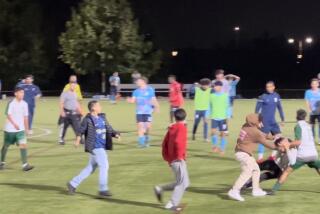Koreas Enjoy Friendly Confines
- Share via
They are called “friendlies,” exhibition soccer matches that are played with no trophies or championships on the line, ideally for the sake of promoting the sport and goodwill. For obvious reasons, North and South Korea hadn’t played one in almost a decade.
Two months ago, on the same day South Korea was making history by becoming the first Asian team to compete in the World Cup’s third-place game, North and South Korea battleships exchanged gunfire. Fans inside Seoul’s sold-out Sangam World Cup Stadium that night paused for a moment of silence to remember the four South Korean sailors who had been killed in the sea battle.
Saturday in Seoul, inside the same stadium, North and South Korean players exchanged handshakes, fans waved Korea unification flags and the two nations finally engaged in their long-awaited--and, for once, aptly named--friendly, playing to a 0-0 draw before a crowd of 60,000.
The match, billed by organizers as “South-North Unification Soccer,” was an extension of a political agreement forged last month, designed to revive reconciliation between the long-hostile countries. It was the first soccer match between the nations since 1993.
“No Matter Which Side Wins, We Are One Nation!” read one large banner hanging inside the stadium. Fans chanted “United Fatherland!” and waved small unification flags featuring a blue Korean peninsula on a white background. Players for both teams wore similar flags on their uniforms.
South Korea, which lost to Turkey in the World Cup third-place match, progressed farther than any Asian nation in the 72-year history of the tournament. Previously, Asia’s best showing was the 1966 quarterfinal appearance by North Korea. Both teams upset Italy during their unlikely runs.
“We made it to the quarterfinals of the World Cup in 1966 and the South Koreans proved themselves the best in Asia at the World Cup [this year],” North Korea Coach Ri Jung-man told reporters after the match. “Together, we are the best in Asia.”
North Korea has yet to return to the World Cup and appeared undermanned against South Korea, which started six key players from its World Cup squad. But the North Koreans played inspired defense and held off a late charge by South Korea, which freed Kim Eun-jung for the potential game-winner in the 74th minute, only to have Kim’s shot carry just over the crossbar.
Guus Hiddink, the South Korean World Cup coach who became a national icon during the summer, returned for the match in his new role as special advisor to his successor, Park Hangseo. After the World Cup, Hiddink resigned from the South Korean team to coach the Dutch club team PSV Eindhoven.
Euro Shockers
Anarchy in the UK, international soccer-style:
Wales 2, Finland 0.
Faroe Islands 2, Scotland 2.
Those results from Saturday’s opening round of qualifiers for the 2004 European Championship had fans all over the United Kingdom talking, or gnashing bicuspids, depending on national affiliation.
Wales, which hasn’t qualified for a major international soccer tournament since the 1958 World Cup, stunned Finland with a two-goal victory in Helsinki, moving the Welsh into a share of the early lead in Group 9 with Italy, a 2-0 winner over Azerbaijan. Goals by John Hartson in the 31st minute and Simon Davies in the 73rd secured the victory for Wales, extending the national team’s unbeaten streak to six games.
Scotland, meanwhile, is staring at a six-game winless streak after a horrid performance against the tiny Faroe Islands, ranked 123rd in the FIFA world rankings. Playing at home in Toftir, the Faroe Islands actually led, 2-0, on a pair of goals by John Petersen in the first 11 minutes--and nearly led, 3-0, when Petersen fired high on an open net from 10 yards out.
Scotland had to rally behind second-half goals by Paul Lambert and Barry Ferguson to escape with a tie and a point. The draw kept new coach Berti Vogts winless (0-5-1) in his first six matches with the Scottish national team. The five consecutive defeats comprised the longest losing streak in Scotland’s 130-year history of international soccer.
“We played only 45 minutes,” Vogts groused. “I cannot understand what happened and why we did not keep up to speed in the first half. We played without emotion, we made many mistakes.”
Scotland could be playing Vogts, the former German national team player and coach, out of a job. Scotland already trails Germany, a 2-0 winner over Lithuania, by two points in Group 5.
Ugliness In Moscow
Violence again broke out in Moscow surrounding another performance by the Russian national team, this time during the hours preceding a 4-2 home victory over Ireland in a Euro 2004 qualifier Saturday.
According to the Interfax news agency, quoting local police, at least 12 visiting fans were injured in fights with Russian supporters outside a hotel near Red Square where many Irish fans were staying.
Three Irish supporters and one Dutch fan were hospitalized and at least six Russian fans were arrested, according to police.
One man was stabbed and more than 100 others injured during a June riot in Moscow after Russia’s World Cup loss to Japan.
More to Read
Go beyond the scoreboard
Get the latest on L.A.'s teams in the daily Sports Report newsletter.
You may occasionally receive promotional content from the Los Angeles Times.






